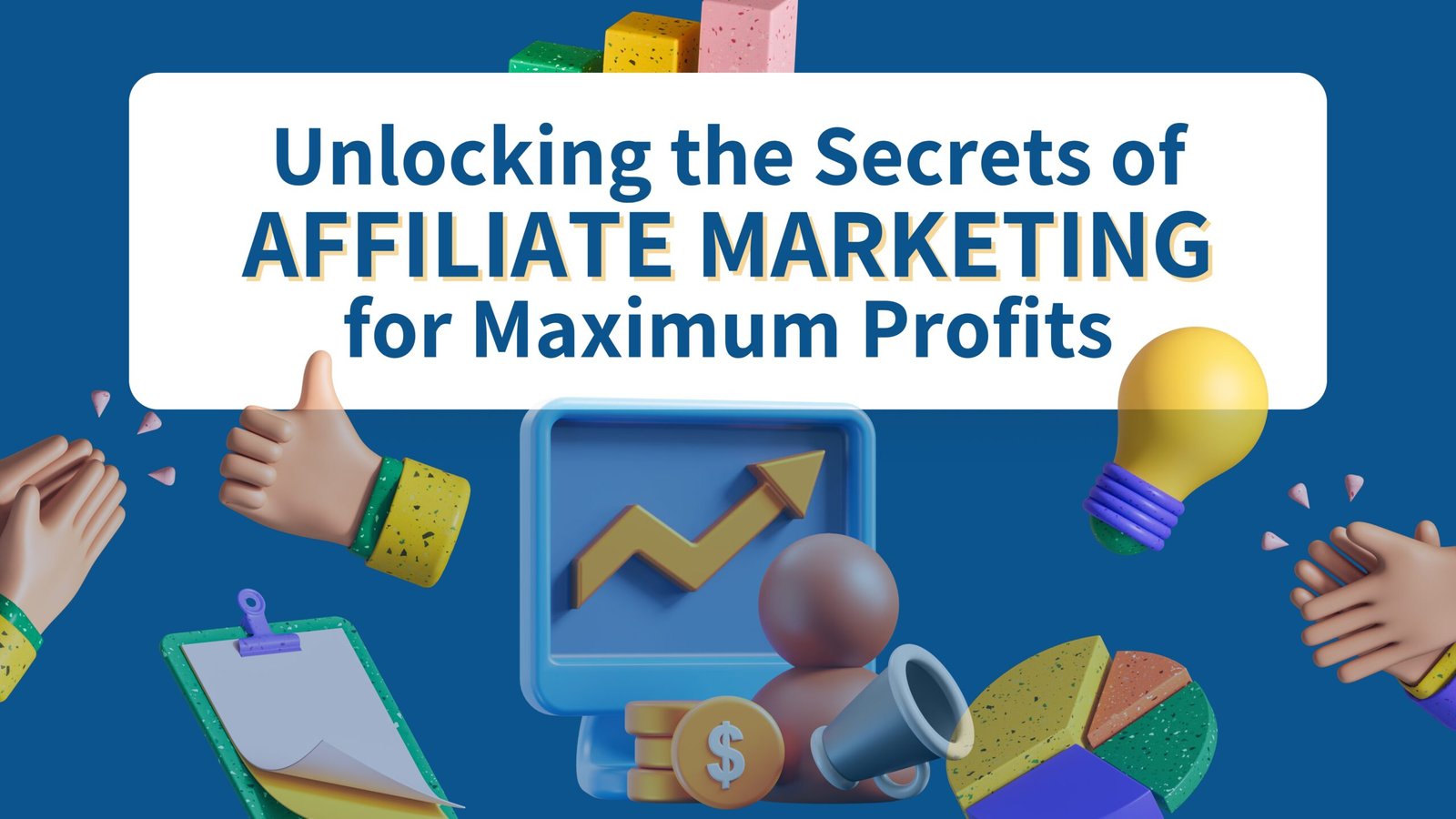Affiliate marketing has become one of the most popular ways to make money online. Whether you are a beginner looking to get started or an experienced marketer aiming to boost profits, understanding the core concepts of affiliate marketing is essential for success. In this blog, we will explore what affiliate marketing is, how it works, the types of affiliate marketing, the advantages and disadvantages, and how you can become a successful affiliate marketer.
What Is Affiliate Marketing?
Affiliate marketing is where an individual (affiliate) promotes products or services from another company and earns a commission for every sale or lead they generate. It’s like being a middleman between the product or service provider and the consumer. The affiliate uses various online platforms like blogs, websites, social media, or YouTube to share the product links, and when someone purchases through that link, the affiliate earns a commission.
Understanding Affiliate Marketing
Affiliate marketing is a performance-based business. The affiliate only earns money when a specific action is completed, such as purchasing, filling out a form, or signing up for a service. The primary participants in affiliate marketing include:
- The Merchant: The business or individual owns the product or service.
- The Affiliate: The person or company promoting the product or service.
- The Consumer: The person who buys the product or service through the affiliate’s link.
The affiliate doesn’t need to create their products or handle the logistics. Instead, they focus on driving traffic and potential customers to the merchant’s website. In return, they earn a commission for each successful conversion.
Examples of Affiliate Marketing
Let’s break down some common examples of affiliate marketing:
- Amazon Associates: Amazon’s affiliate program, known as “Amazon Associates,” is one of the most popular affiliate programs. Affiliates can promote a wide range of products on Amazon and earn commissions when people purchase through their links.
- Bloggers and Review Websites: Many bloggers and content creators use affiliate marketing by writing product reviews and including affiliate links. For instance, a tech blogger may write about a laptop and include affiliate links to purchase it from online stores.
- YouTube: YouTubers promote products and services in their videos with affiliate links in the description. If viewers click the link and purchase, the YouTuber receives a commission.
- Social Media Influencers: Social media influencers promote affiliate products on platforms like Instagram, Twitter, and Facebook. They share links in their posts or bio, and when followers purchase through them, they earn commissions.
Types of Affiliate Marketing
Affiliate marketing can be broken down into different types based on the commission structure and method of promotion. Here are the most common types:
- Unattached Affiliate Marketing:
This is the most basic form of affiliate marketing. The affiliate promotes a product or service without any prior experience or relationship with the product. In this case, the affiliate has little to no direct involvement with the consumer. They promote the product using their affiliate link and earn a commission on the sale.
- Related Affiliate Marketing:
In related affiliate marketing, the affiliate promotes a product they have some experience with or interest in. They often share their personal experiences with the product, making their recommendations more credible and trustworthy to their audience.
- Involved Affiliate Marketing:
In this model, the affiliate actively participates in marketing. They may have personally used the product or service and actively promoted it with strong recommendations. They build trust with their audience through transparency and authenticity.
Advantages and Disadvantages of Affiliate Marketing
Affiliate marketing is an appealing business model for individuals earning income online. While it offers numerous benefits, it also comes with challenges. Let’s explore the advantages and disadvantages of affiliate marketing and some special considerations for those looking to start.
Advantages of Affiliate Marketing
1. Low Startup Costs
Starting affiliate marketing requires minimal investment compared to traditional businesses. You only need a platform—a blog, website, or social media account—and an internet connection. With free or affordable tools like WordPress or social media platforms, getting started is easier than ever.
2. Passive Income
One of the most attractive features of affiliate marketing is the potential to earn passive income. Once your content is live, it can continue to generate revenue as long as people interact with it and make purchases. This makes affiliate marketing an excellent option for those seeking financial freedom.
3. No Product Creation
You don’t need to worry about developing or maintaining products as an affiliate marketer. The merchant handles all product creation, inventory, shipping, and customer service. This allows you to focus solely on marketing and content creation.
4. Flexible Working Hours
Affiliate marketing offers unparalleled flexibility. You can work from anywhere and set your schedule, making it an ideal option for digital nomads, stay-at-home parents, or anyone seeking work-life balance.
5. Scalable Income Potential
Affiliate marketing has immense scalability. As your audience and traffic grow, your income can increase significantly. You can expand your business and boost your profits with consistent effort and the right strategies.
Disadvantages of Affiliate Marketing
1. Dependence on the Merchant
Affiliate marketers rely heavily on merchants to deliver quality products and customer service. If the merchant fails to meet customer expectations, it can negatively affect your reputation and earnings. Additionally, sudden changes in commission rates or program policies can impact your income.
2. High Competition
Affiliate marketing is a popular field, meaning competition is fierce. Thousands of affiliates might promote the same products, making it challenging to stand out. You must develop unique content and establish a strong personal brand to succeed.
3. Unpredictable Earnings
Income in affiliate marketing can be inconsistent. Factors like seasonal demand, product popularity, and website traffic fluctuations can all affect your revenue. It’s not uncommon for affiliate marketers to experience months of lower-than-expected earnings.
4. Requires Time and Effort
Although affiliate marketing can eventually become a source of passive income, building a successful affiliate business takes time and dedication. Creating high-quality content, attracting an audience, and optimizing your strategies requires consistent effort, especially in the early stages.
Special Considerations for Affiliate Marketing
Before diving into affiliate marketing, keep the following tips in mind to maximize your success:
1. Choose the Right Affiliate Programs
Research is crucial when selecting affiliate programs. Look for companies or affiliate marketing agencies that offer:
Transform Your Digital Presence
Get personalized strategies and solutions tailored to your business needs.
- Free Initial Consultation
- Custom Solution Planning
- Expert Team Support
- Competitive Commissions: Ensure you’re earning a fair percentage for your efforts.
- Reliable Payouts: Check reviews to confirm timely payments.
- High-Quality Products: Promote products that align with your niche and audience interests. Recommending low-quality items can harm your credibility.
2. Focus on Building Trust
Trust is the foundation of affiliate marketing. Be honest about the products you promote and transparent about your affiliate relationships. Authenticity helps build a loyal audience, essential for driving consistent conversions.
3. Track Your Results
Use tools like Google Analytics, affiliate dashboards, and link trackers to monitor your performance. Monitor metrics such as clicks, conversions, and earnings to identify what’s working and what isn’t. This data will help you refine your strategies and maximize your income.
How Do Affiliate Marketers Get Paid?
Affiliate marketing offers several payment models that allow marketers to earn income by promoting products and services. These models ensure flexibility, catering to different niches and strategies. Here are the primary ways affiliate marketers get paid:
1. Pay Per Sale (PPS)
Pay Per Sale is the most common affiliate marketing model. Marketers earn a commission when customers purchase a product or service through their affiliate link. The commission percentage varies depending on the merchant and the product type. For example, luxury goods offer higher commissions, while lower-priced items may have smaller payouts. This model incentivizes marketers to focus on quality content that drives conversions.
2. Pay Per Click (PPC)
In the Pay Per Click model, affiliate marketers earn money based on the number of clicks their affiliate link generates. Payment is not dependent on whether the visitor makes a purchase. This method is ideal for marketers who excel at driving traffic to merchant websites, often through high-traffic platforms like blogs, social media, or paid advertising.
3. Pay Per Lead (PPL)
The Pay Per Lead model pays marketers when users complete specific actions after clicking the affiliate link. These actions could include filling out a form, subscribing to a newsletter, signing up for a free trial, or downloading an app. This model is commonly used in industries like SaaS (Software as a Service), insurance, or education, where generating leads is a critical business goal.
How Much Money Can You Make As an Affiliate Marketer?
Your income as an affiliate marketer depends on several factors, including:
- The affiliate programs you join
- The traffic your website or social media platforms receive
- The number of conversions (sales or leads) you generate
- The quality of your content and promotion efforts
Some affiliates make only a few monthly dollars, while others earn thousands. With the right strategies, it’s possible to turn affiliate marketing into a full-time business with significant earning potential.
Can Beginners Do Affiliate Marketing?
Absolutely! Affiliate marketing is beginner-friendly and does not require advanced skills. However, it does require dedication, time, and effort. Starting small and learning from others can help you build the foundation for long-term success.
Can You Start Affiliate Marketing With No Money?
Yes, you can start affiliate marketing with little to no money. Free platforms are available, such as social media, blogging platforms (like WordPress), and video platforms (like YouTube), to promote affiliate products. All you need is creativity and consistency.
How to Become an Affiliate Marketer
Affiliate marketing is a great way to earn passive income by promoting products and earning commissions. If you’re wondering how to get started, here’s a step-by-step guide:
1. Choose a Niche
Start by identifying a specific niche you’re passionate about or knowledgeable in. This could be anything from health and fitness to technology or fashion. A focused niche helps you build a dedicated audience and establish yourself as an expert.
2. Join Affiliate Programs
Research and sign up for affiliate programs that align with your niche. Popular options include Amazon Associates, ShareASale, and ClickBank. Alternatively, collaborate with affiliate marketing agencies that connect you with relevant brands and products.
3. Create High-Quality Content
Content is the cornerstone of affiliate marketing. Develop engaging blog posts, videos, social media updates, or email newsletters that provide value to your audience. Your content should naturally incorporate affiliate links without appearing overly promotional.
4. Promote Affiliate Products
Strategically include affiliate links in your content. Offer honest reviews, tutorials, or recommendations to build trust and encourage your audience to purchase. Highlight the benefits of the products to appeal to your readers.
5. Track Your Results and Improve
Monitor your affiliate marketing performance using tools like Google Analytics or affiliate dashboards. Pay attention to metrics like click-through rates and conversions. Experiment with strategies to improve your results, such as optimizing your content or testing new platforms.
Conclusion
Affiliate marketing presents a tremendous opportunity for anyone earning passive income online. Whether you’re a beginner or an experienced marketer, it’s essential to understand the core principles of affiliate marketing, from choosing the right affiliate programs to creating valuable content that resonates with your audience. While it requires effort, consistency, and patience, the rewards can be significant.
You can earn commissions by leveraging affiliate marketing services and partnering with the proper affiliate marketing agencies and companies while promoting products you believe in. Always remember that building trust with your audience is key to long-term success.
So, if you’re ready to plunge into affiliate marketing, start by educating yourself, finding the right products, and promoting them authentically. With the right strategies, affiliate marketing can help you unlock the potential for maximum profits and turn your passion into a profitable online business.





